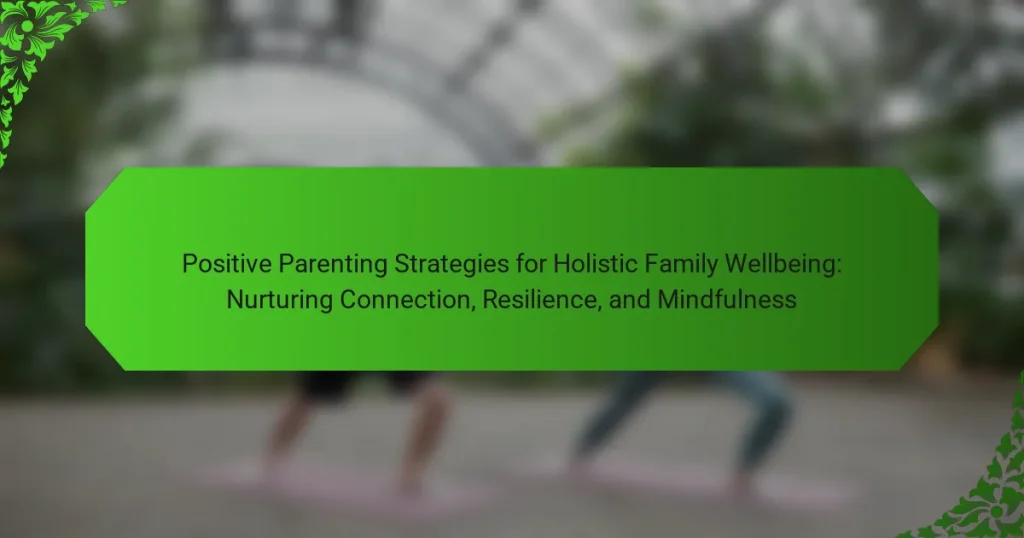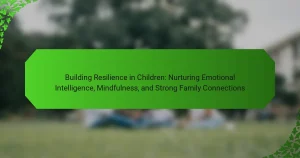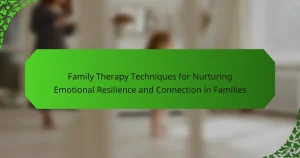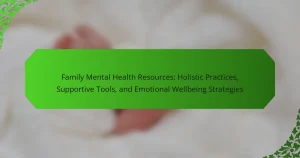Positive parenting strategies enhance family wellbeing by fostering connection, resilience, and mindfulness. Effective communication, consistent discipline, and emotional support are key components. These approaches promote trust and encourage positive behaviours. Additionally, family rituals and nature-based activities strengthen bonds while teaching essential life skills.
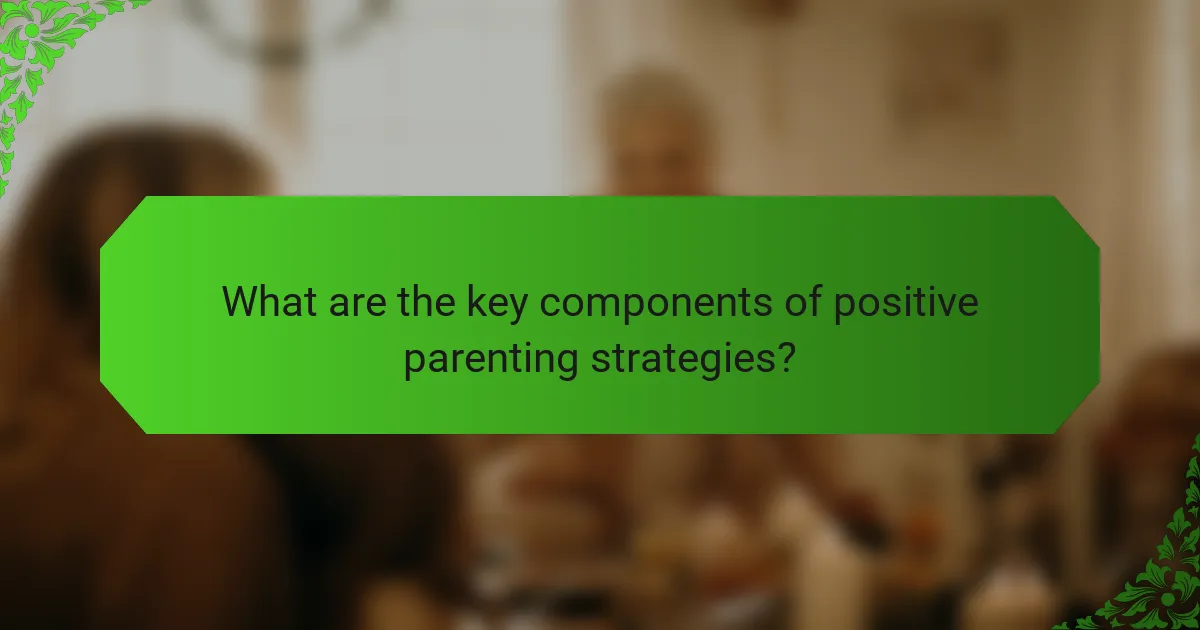
What are the key components of positive parenting strategies?
Positive parenting strategies focus on nurturing connection, resilience, and mindfulness within families. Key components include effective communication, consistent discipline, emotional support, and fostering independence. These strategies enhance family wellbeing by building trust and encouraging positive behaviours. For example, active listening promotes understanding and strengthens relationships. Additionally, modelling resilience helps children navigate challenges, while mindfulness practices cultivate emotional regulation.
How does nurturing connection benefit family dynamics?
Nurturing connection enhances family dynamics by fostering trust, communication, and emotional support. Families that prioritise connection experience improved resilience and conflict resolution. Research shows that strong familial bonds lead to better mental health outcomes for all members. By practising mindfulness and active listening, parents can create a nurturing environment that strengthens relationships.
What role does resilience play in holistic family wellbeing?
Resilience significantly enhances holistic family wellbeing by fostering adaptability and emotional strength. It enables families to navigate challenges together, promoting a supportive environment. Resilient families communicate effectively, which nurtures connection and mindfulness. This interconnectedness leads to improved mental health and stronger relationships, ultimately contributing to a harmonious family life.
Why is mindfulness essential in parenting?
Mindfulness is essential in parenting as it fosters emotional awareness and connection. Practising mindfulness helps parents respond to their children’s needs with patience and empathy. This approach enhances resilience, allowing families to navigate challenges together. Research indicates that mindful parenting can lead to improved mental health outcomes for both parents and children, creating a supportive environment for growth.
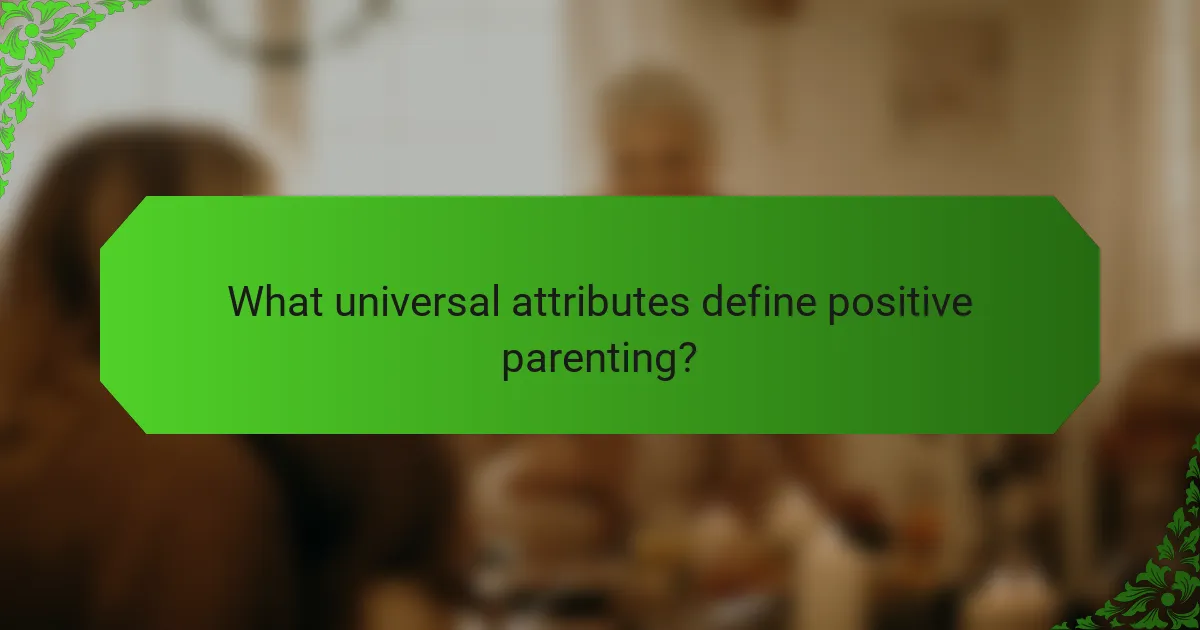
What universal attributes define positive parenting?
Positive parenting is defined by attributes such as nurturing communication, emotional support, consistent discipline, and fostering independence. These elements cultivate a strong family bond, enhance resilience, and promote mindfulness in children. By prioritising connection and understanding, parents create a positive environment that encourages growth and wellbeing.
How does effective communication enhance family relationships?
Effective communication significantly enhances family relationships by fostering understanding and emotional connection. Clear dialogue helps family members express feelings and resolve conflicts, leading to a supportive environment. Active listening is crucial; it ensures everyone feels valued and heard, strengthening bonds. Regular family discussions promote transparency, allowing for shared experiences and collective problem-solving. As a result, families develop resilience, adaptability, and mindfulness, which are essential attributes for holistic wellbeing.
What are the benefits of emotional intelligence in children?
Emotional intelligence in children enhances social skills, empathy, and self-regulation. These benefits foster better relationships and improved academic performance. Children with high emotional intelligence can navigate peer interactions effectively, reducing conflicts. As a result, they develop resilience to cope with challenges, promoting overall mental health.

What unique approaches can enhance holistic wellbeing?
Positive parenting strategies enhance holistic family wellbeing by fostering connection, resilience, and mindfulness. These approaches include active listening, promoting emotional intelligence, and encouraging family rituals.
Active listening builds trust and understanding among family members, allowing them to express feelings openly. This practice strengthens connections and enhances emotional resilience.
Promoting emotional intelligence equips children with skills to manage their emotions and empathise with others. This unique attribute contributes to healthier family dynamics and reduces conflict.
Encouraging family rituals, such as shared meals or game nights, creates a sense of belonging. These activities reinforce mindfulness and strengthen family bonds, contributing to overall wellbeing.
How can creative expression foster connection among family members?
Creative expression fosters connection among family members by enhancing communication, promoting empathy, and encouraging shared experiences. Engaging in activities like art, music, or storytelling allows family members to express emotions and thoughts. This shared creativity builds stronger bonds and creates a supportive environment. Additionally, creative expression can foster resilience by helping families navigate challenges together, reinforcing their collective identity.
What impact does nature exposure have on family mental health?
Nature exposure significantly enhances family mental health by reducing stress and fostering emotional resilience. Studies indicate that spending time outdoors improves mood and promotes mindfulness among family members. Engaging with nature encourages connection, strengthens family bonds, and nurtures a sense of belonging. As a result, families experience improved overall wellbeing and a greater ability to cope with challenges.
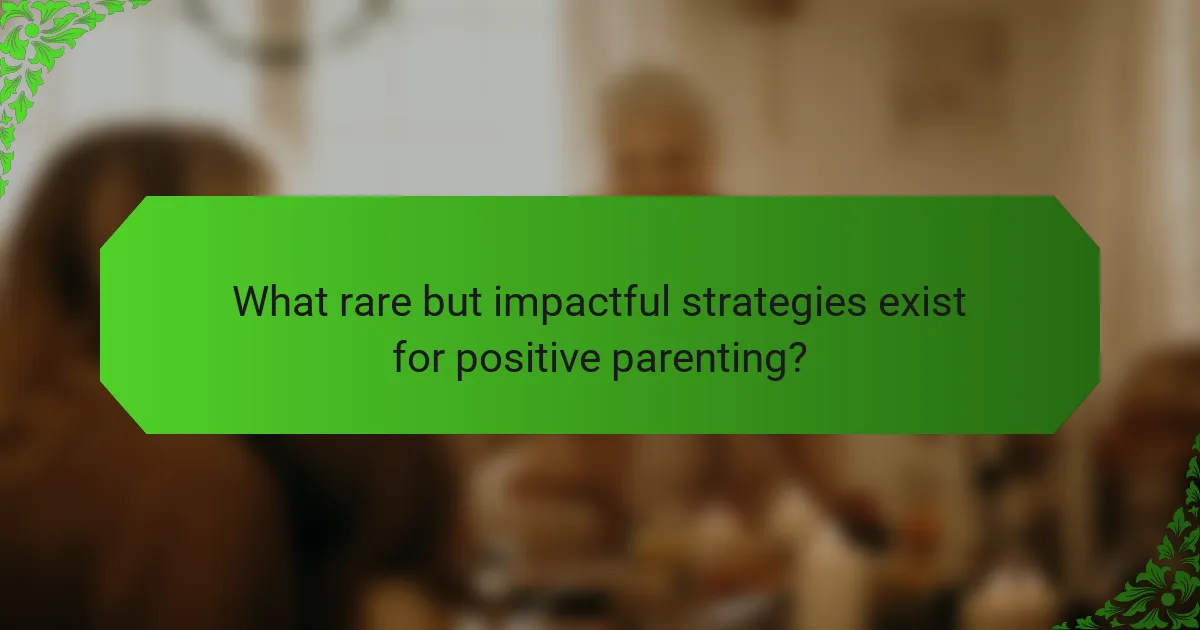
What rare but impactful strategies exist for positive parenting?
Rare but impactful strategies for positive parenting include fostering emotional intelligence, practising reflective listening, and implementing nature-based activities. These approaches enhance connection and resilience within families. Emotional intelligence allows parents to model empathy and understanding, creating a nurturing environment. Reflective listening encourages open communication, validating children’s feelings and promoting trust. Nature-based activities, such as family hikes or gardening, strengthen bonds while teaching mindfulness and appreciation for the environment. These strategies contribute to holistic family wellbeing by nurturing essential life skills.
How can family rituals strengthen bonds?
Family rituals can significantly strengthen bonds by fostering connection and creating shared experiences. Engaging in regular family activities, such as weekly game nights or seasonal traditions, enhances communication and trust. Research shows that families who practise rituals report higher levels of emotional resilience and mindfulness. These rituals serve as a unique attribute of family life, promoting a sense of belonging and stability. As a result, families cultivate deeper relationships, enhancing overall wellbeing.
What is the significance of intergenerational learning in families?
Intergenerational learning in families fosters strong connections, enhances resilience, and promotes mindfulness. It enables knowledge transfer, emotional support, and shared values across generations. This dynamic strengthens family bonds, creating a nurturing environment that benefits all members. Families practising intergenerational learning report increased emotional intelligence and improved problem-solving skills, contributing to holistic wellbeing.
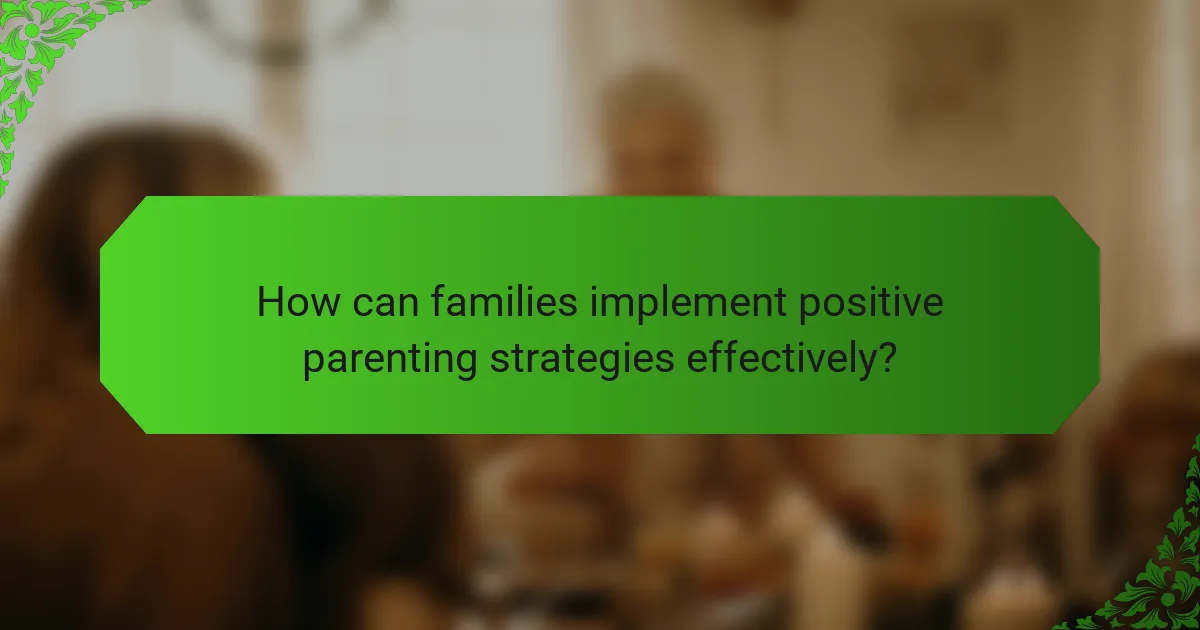
How can families implement positive parenting strategies effectively?
Families can implement positive parenting strategies effectively by fostering open communication, setting consistent boundaries, and practising empathy. Establishing a nurturing environment enhances connection and resilience among family members. Regular family activities promote mindfulness and strengthen relationships. Additionally, utilising resources like parenting workshops can provide valuable insights and support.
What are actionable steps to create a mindful family environment?
Creating a mindful family environment involves intentional practices that foster connection and resilience. Start by establishing daily routines that include family discussions about feelings and experiences. Encourage open communication to strengthen emotional bonds.
Incorporate mindfulness activities, such as meditation or yoga, to promote awareness and reduce stress. Set aside time for family activities that nurture togetherness, like cooking or outdoor adventures.
Model positive behaviours, such as gratitude and empathy, to instil these values in children. Finally, create a designated space in the home for relaxation and mindfulness, allowing family members to retreat when needed.
How can a daily gratitude practice be established?
Establishing a daily gratitude practice enhances family wellbeing and strengthens connections. Begin by setting aside a specific time each day for family members to share three things they are grateful for. This simple routine fosters mindfulness and resilience. Encourage children to express their feelings and reflect on positive experiences, reinforcing their emotional growth. As a result, families cultivate a supportive environment that nurtures connection and promotes holistic wellbeing.
What routines can support emotional wellbeing for all family members?
Engaging in routines that promote emotional wellbeing can significantly enhance family dynamics. Key strategies include establishing consistent family meals, practising mindfulness activities, and encouraging open communication.
1. Family meals strengthen connections and provide a platform for sharing experiences.
2. Mindfulness activities, such as meditation or yoga, foster resilience and reduce stress.
3. Open communication nurtures emotional safety, allowing family members to express feelings freely.
Incorporating these routines can lead to improved emotional health for all family members.
What common mistakes should families avoid in positive parenting?
Families should avoid common mistakes that hinder positive parenting, such as inconsistency in discipline, lack of communication, and neglecting self-care. Inconsistent discipline confuses children and undermines their sense of security. Open communication fosters trust and emotional connection; without it, misunderstandings arise. Neglecting self-care can lead to parental burnout, negatively impacting the family dynamic. Prioritising these aspects enhances holistic family wellbeing.
What expert insights can guide families towards holistic wellbeing?
Positive parenting strategies foster holistic family wellbeing through nurturing connection, resilience, and mindfulness. Families can adopt practices such as open communication, emotional validation, and shared activities to enhance relationships. Research shows that consistent family routines increase children’s resilience by providing stability and security. Mindfulness techniques, like family meditation or gratitude exercises, promote emotional awareness and stress reduction. These insights empower families to create a supportive environment that prioritises overall wellness.
